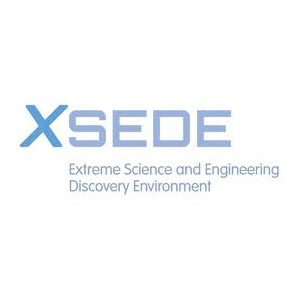 XSEDE has selected five Campus Champions Fellows for the 2019-2020 academic year. These exceptional researchers will have the opportunity to work side-by-side with staff of the XSEDE project to solve real-world science and engineering projects.
XSEDE has selected five Campus Champions Fellows for the 2019-2020 academic year. These exceptional researchers will have the opportunity to work side-by-side with staff of the XSEDE project to solve real-world science and engineering projects.
Among their many roles, XSEDE Campus Champions serve as local experts on national cyberinfrastructure resources and organizations, such as XSEDE. Champions are closely connected to those doing cutting-edge research on their campuses. The goal of the Campus Champions Fellows program is to increase cyberinfrastructure expertise on campuses by including CCs as partners in XSEDE’s Extended Collaborative Support Services (ECSS) projects.
The five Fellows selected for this year will work on projects spanning from hydrology gateways to undergraduate data science curriculum development under the overarching goal of increasing cyberinfrastructure expertise on campuses by including Campus Champions as partners in XSEDE’s projects.
The Fellows and their projects are as follows:
Fellow: Brady Butler, University of Maine
Mentor: Vinit Sharma, National Institute for Computational Sciences (NICS)
ECSS PI: Yigui Wang, Southern Connecticut State University
Project Title: Computational Studies on Physical and Chemical Properties
Project Description: Research in Dr. Wang’s lab involves four projects that will lead to an understanding of the origin of the physical and chemical properties and the design of compounds with new properties: (1) Optical rotation dispersion, (2) Reactivity of chemical compounds, (3) Excited state properties and (4) Redox reactions. Brady Butler seeks to understand the unique demands of primary undergraduate institutions (PUIs) and XSEDE resources, which are crucial for the research.
Fellow: Beau Christ, Wofford College
Mentor: Kate Cahill, Ohio Supercomputer Center (OSC)
Project Title: Workforce Development: Education
Project Description: The XSEDE education program seeks to expand a capable and innovative advanced digital resource workforce across the country by providing access to example programs, course syllabi, and computational science education materials as well as guidance from XSEDE’s education staff. Through the education program, Champions may propose a project to help create a formal undergraduate or graduate minor, concentration, or certificate program at their institution. This requires working with the faculty to identify the courses that would be part of such a program, locating and testing computational projects that would become parts of those courses, and working with the appropriate academic committees to prepare the materials needed to obtain program approval. Beau Christ will specifically work with XSEDE on the development of a “Data Science” course and the creation of a new “Computational and Data Science research lab” to engage undergraduates in real-world research.
Fellow: Kyle Hutson, Kansas State University
Mentor: Alex Withers, National Center for Supercomputing Applications
Project Title: Fellows Designed Project – Documenting NIST 800-171 for working with Classified Uncontrolled Information
Project Description: One of the challenges Kansas State University is beginning to face is the requirement from funding agencies to implement controls related to Controlled Unclassified Information (CUI) in accordance with NIST 800-171. This document specifies 110 controls which must be in place in order to receive data from the funding agency. While many of these controls are costly and an inconvenience to an individual researcher with a small amount of CUI data, when moving to HPC, these costs can easily skyrocket to the point of infeasibility. Parts of the CUI framework are administrative and parts are technical. Hutson plans to implement easy-to-follow solutions on the technical parts and advise on the non-technical parts, all in a recipe-style format which can be easily implemented, addressing gaps between what can be automated and what must be specific to every site’s documentation in order to minimize the time a site must spend investigating and resolving these issues.
Fellow: Helen Kershaw, Brown University
Mentor: Anand Padmanabhan, National Center for Supercomputing Applications
ECSS PI: David Tarboton, Utah State University
Project Title: Powering the HydroShare Science Gateway
Project Description: Helen Kershaw aims to enable community research by facilitating collaborative and reproducible hydrologic science that advances hydrologic understanding through scalable integration of data and models from many sources. XSEDE resources will be used to host HydroShare-JupyterHub, a science gateway application that is part of the HydroShare Hydrologic Information System operated by the Consortium of Universities for the Advancement of Hydrologic Science Inc. (CUAHSI). HydroShare-JupyterHub leverages CyberGIS-Jupyter (a novel geospatial information system and science framework for integrating cyberinfrastructure and Jupyter Notebook capabilities to achieve reproducible and scalable geospatial analytics) to provide access to state of the art models and HPC resources for advancing understanding in hydrology, making advancing hydrologic modeling accessible to a broad community of Earth science researchers, thereby transforming research practices and the knowledge generated from this research.
Fellow: Mike Renfro, Tennessee Tech University
Mentor: Rich Knepper, Cornell University
Project Title: Cyberinfrastructure Resource Integration (CRI)
Project Description: Mike Renfro will work with the XSEDE Cyberinfrastructure Integration (XCI) team on projects which bridge activities between a local campus or campuses and XSEDE resources. These include creating workflow submission systems that send jobs to XSEDE Service Provider resources from campus, the creation of shared virtual compute facilities that allow jobs to be executed on multiple resources, data management for researchers with Globus Connect, the creation of local XSEDE Compatible Cluster Systems, or other projects that utilize tools which reduce barriers for scaling analyses from campuses to national cyberinfrastructure.
Accepted Fellows, with the support of their home institution, make a 400-hour time commitment and are paid a stipend to allow them to focus time and attention on these collaborations. The program also includes funding for two visits, each ranging from one to two weeks, to an ECSS, PI or conference site to enhance the collaboration.



